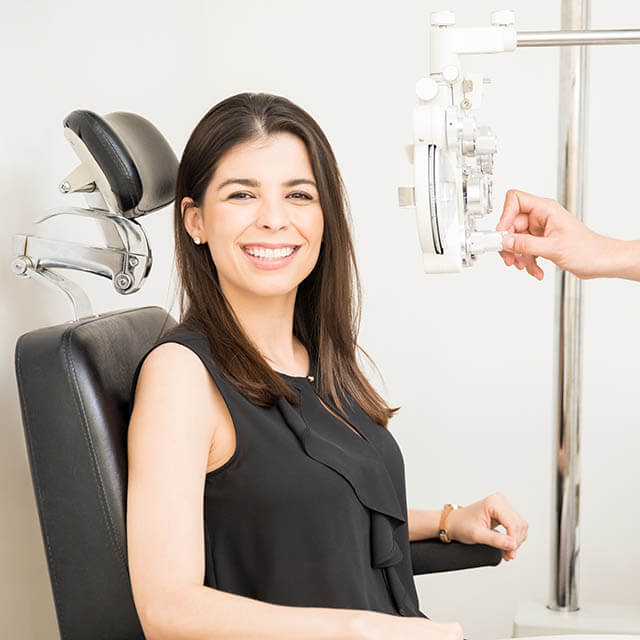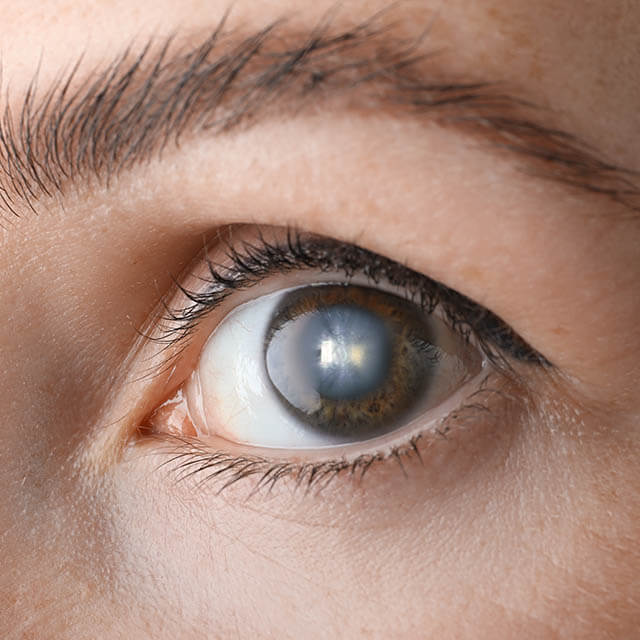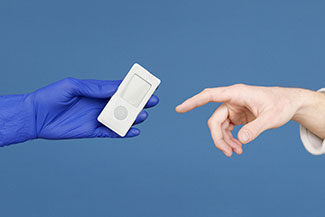Eye Disease Management
Is your vision blurred or cloudy?
Seeing dark spaces in the center of your vision?
You might have an eye disease.
Contact us for effective treatment and experience a heightened quality of life.
Eye Disease Diagnosis and Treatment

Your eyes keep changing with every year that goes by, and this affects vision.
We can detect these changes and identify eye conditions or diseases early enough to treat and prevent vision loss.
Whether you have diabetic retinopathy, glaucoma, cataracts, or macular degeneration, we’re here to help you maintain the best vision and eye health possible.
The earlier the diagnosis, the better your chances for successful treatment.
What is Diabetic Retinopathy and How Can It Be Treated?
Diabetic retinopathy occurs when the retina's tiny blood vessels weaken and inflate as a result of high blood sugar levels. As the blood vessels grow, they bleed—causing severe vision loss, and in extreme cases even blindness.
The early and intermediate phases of this disease typically show no symptoms or warning signs. However, as the macula (central part of the retina) becomes inflamed and the disease progresses, discomfort or blurred vision may develop.
Note that diabetic retinopathy can be treated before any vision loss occurs. Treatment and management options include:
- Medication
- Anti-VEGF or steroid injections
- Laser surgery
- Vitrectomy
I started using CRT (Ortho-k) lenses from Dr. Synder when I was roughly 13 years old. Six years later, I am still comfortably wearing them.
These lenses are easy to put on and to sleep in at night, and by the next morning, my vision is crisp and clear!
I would recommend those who are worried about misplacing their glasses, or troubled by daily lenses, to give CRTs a try.
Dr. Snyder is very knowledgable and approachable, and has since answered all of my questions and concerns.
I am very glad that he is my eye doctor!
What Is Glaucoma and How Can It Be Treated?
Glaucoma is a group of eye diseases caused by a buildup of pressure within the eye. The longer the pressure builds, the more damage it causes, especially to the optic nerve.
In the absence of medical intervention, the nerve will continually deteriorate, resulting in permanent vision loss or blindness.
While glaucoma cannot be cured, there are several treatments that can help slow down the progression of this disease. These treatments include:
- Eye drops
- Oral medications
- Filtration surgery
- Laser therapy
- Drainage tubes
- Minimally invasive glaucoma surgery (MIGS)


What Are Cataracts and How Can The Disease Be Treated?
A cataract occurs when the clear lens inside our eye becomes cloudy. Cataracts develop slowly and reduce the amount of light that can get through the lens, rendering it difficult to see. Those with cataracts feel as if they’re perpetually looking through a dirty window that cannot be cleaned.
If the cataract is at an advanced stage, your eye doctor will likely recommend cataract surgery, a safe procedure where the cloudy lens is replaced with a new intraocular lens (IOL).
What is Macular Degeneration and
How Can It Be Treated?
Macular degeneration is the deterioration of the central part of the retina, the part of the eye that records the images we see and sends them back to the brain. As the macula deteriorates, the brain receives blurred or distorted images instead of clear and bright images.
There are two types of macular degeneration: dry AMD and wet AMD.
While there is currently no treatment for dry AMD, those with significant vision loss might benefit from taking certain nutritional supplements.
For wet AMD, treatment options include:
- Anti-VEGF Injections
- Photodynamic Therapy (PDT)
- Laser Photocoagulation

Eye Disease Management | FAQ
We believe that a person’s quality of life is profoundly associated with the quality of their vision. Vision problems, whether due to glaucoma, cataracts, macular degeneration or diabetic retinopathy, affect all aspects of one’s life. We at Oakbrook Optometry can help prevent further vision deterioration and manage your current symptoms.
Schedule a consultation with our optometric team and we’ll help you find the best solution for your condition and lifestyle.








